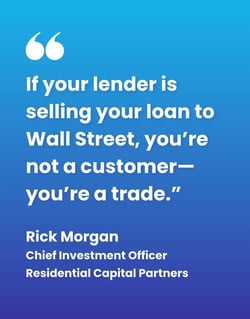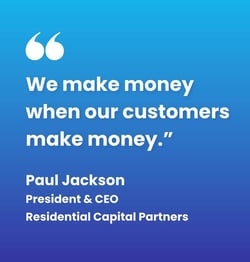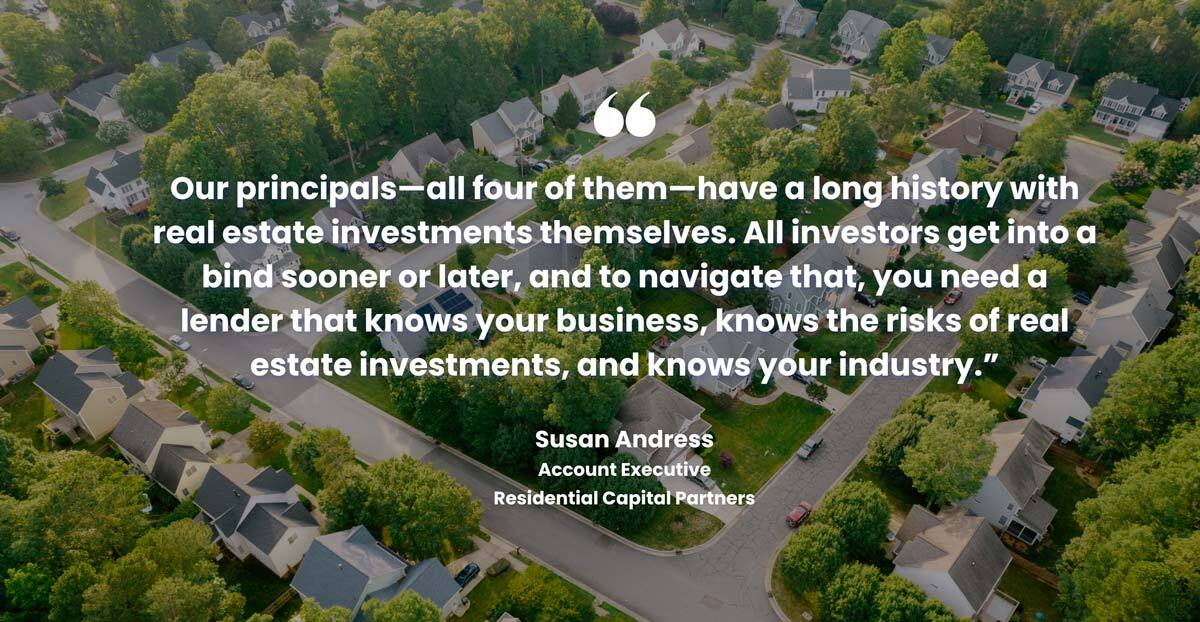
When choosing a lender, most real estate investors don’t put much thought into the origin of the lender’s source of capital—or whether they sell their notes. But choosing a balance sheet lender goes a long way in your ability to control your own destiny. In the words of Rick Morgan, Chief Investment Officer at Residential Capital Partners, “If your lender is selling your loan to Wall Street, you’re not a customer—you’re a trade.”
Before we unpack why “being a trade” matters to your bottom line, let’s clarify what, exactly, qualifies an institution as a balance sheet lender.
 What is Balance Sheet Lending?
What is Balance Sheet Lending?
Most private lenders are in the business of originating loans to fit the buy box of another institution (read: loan aggregator) that is trying to aggregate enough loans to fit the underwriting standards of an investment bank (read: Wall Street) who will then sell the entire pool of loans (read: securitize) to investors. Originate. Aggregate. Securitize. Repeat. And the rules of this game are dictated by Wall Street. At the end of the day, no one that touched the loan through the origination, aggregation or securitization process is left holding the note.
Balance sheet lenders are different. They originate for their own account. They aggregate for their own account. They do not sell loans to anyone. They make the rules, play by the rules, and don’t change the rules at the demands of Wall Street. Instead, they utilize their own funds and hold loans to maturity. Investors’ loans stay on the balance sheet of the original private lender.
Benefits of Using a Balance Sheet Lender
Having your private lender keep your loan on their own books makes an impact in good times and bad. With balance sheet lenders, you’re in direct contact with the decision maker that has influence over your loan, benefitting you in multiple ways:
You are the lender’s actual customer.
Regardless of your success, the same amount of sunlight shines for everybody. There are only so many hours in a day, and there is only so much attention you can put towards each deal. Don’t gobble up more deals than you have the time or infrastructure to pull off. In this business, there can be too much of a good thing.
 Your success is their success.
Your success is their success.
When a non-balance sheet private lender originates your loan, their goal is to close and sell your loan ASAP. Once the loan is sold, they are out of the risk position and onto the next customer. So, if it checks the boxes deemed necessary by Wall Street, they’ll put it on the books.
But what if the loan checks the boxes… but is not good for the borrower?
Balance sheet lenders aren’t selling your loan the day after they book it. They hold it to maturity, so they have skin in the game, just like you. Which means they are highly motivated to ensure a loan is a good investment to both parties. Balance sheet lenders look for profitable deals that propel their customers to the next level of growth.
No impact from capital markets.
One of the biggest heartaches for investors is when a deal falls through just shy of closing. Lenders selling your note to Wall Street are notorious offenders in this arena. When the winds change, a global pandemic blossoms, or a hurricane blows in and the market turns, the investment banks on Wall Street can freeze up and stop their operations. Thus, the private lenders making your loan are subsequently forced to freeze too.

One point of contact.
“Balance sheet lending can be one of those things that doesn’t matter until it really, really does,” says James Loffredo, Account Executive at Residential Capital Partners, “If you’re working on a $500K project and a hailstorm hits on Saturday, you need a point of contact before Monday morning. Our clients have our cellphone numbers. You’re not going to be on hold, like you would with a big servicer.” Communication is a priority for relationship-oriented private lenders.
Some lenders, like Residential Capital Partners, also provide bridge loans and rental loans to investors. Having one point of contact during that transition ensures nothing falls through the cracks. “Instead of selling a property, sometimes investors will keep it to earn mailbox money and build wealth. Not to mention extensive write-offs!” says Kyle Dryer, Account Executive at Residential Capital Partners.
A faster “yes” or “no”.
With balance sheet lenders, wait times are minimized because there’s no need for external approval. “We can get to a decision maker on the same day,” says Susan Andress, Account Executive at Residential Capital Partners. “We have partnerships with some clients spanning 10 or 12 years—and for them, we may close in three days.” Less overhead means less time wasted waiting for an answer.
Be A Customer, Not a Trade
People become real estate investors because they want to control their own destiny. One way to ensure you’re the one in the driver’s seat is by partnering with other people in control of their own destiny, too. Residential Capital Partners makes your loan a straightforward affair. We only answer to ourselves—and that control empowers us to be a good partner to our borrowers, so that together, we can control our collective future. That’s the definition of partnership.

Own your own destiny.



